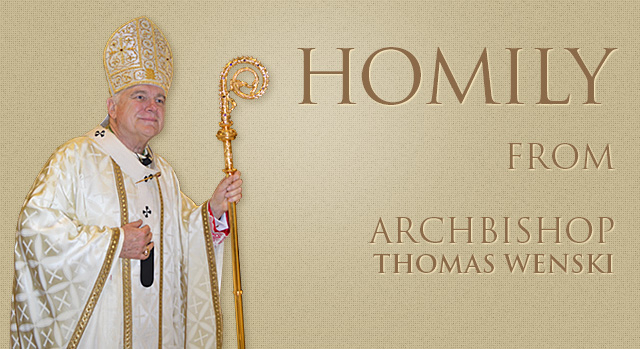By Archbishop Thomas Wenski - The Archdiocese of Miami
Archbishop Thomas Wenski preached this homily on the feast of Saint Luke, evangelist, at a Mass celebrated in Boston on Oct. 18, 2017.
In the responsorial psalm, our refrain was “Your friends make known, O Lord, the glorious splendor of your Kingdom.” In Haitian Creole – the language that I celebrated Mass and preached in for 18 years – the word "saint" is translated Zanmi Bondye; simply, a friend of God.
Luke certainly was one such friend – truly a Zanmi Bondye.
St. Luke, as we learn from the first reading, was a companion of St. Paul. He was also thought to be a physician and as an early disciple of the Lord. He gave us the Gospel that bears his name as well as the account of the early history of the Church in the Acts of the Apostles.
Thanks to Luke, the Church’s prayer life is enriched with the Benedictus, the Magnificat and the Nunc Dimittis. Again, thanks to him and his Gospel, we have Jesus’ parables of the Good Samaritan and the Prodigal Son.
And, only in his Gospel, perhaps because of his being a physician, he describes Jesus as “sweating blood” during his agony. Luke, the physician, tells us how the power of God in Jesus seeks and finds the last, the least and those lost in the black labyrinths of sickness and despair.
In fact, the Gospel of Luke is the gospel of the lost who are found by God who searches us out and knows us. It’s the gospel of the woman lost in sin who anoints Jesus’ feet at the house of Simon the Pharisee. It’s the gospel of the woman lost in the agony of a crippling spirit for eighteen years. It’s the gospel of the woman lost in the terrible suffering of hemorrhages for twelve years. It’s the gospel of lepers lost in the stigma and isolation of their disease. It’s the gospel of Jairus who is lost in the terror of losing his sick daughter. It’s the gospel of the widow at Nain who had lost her only son and was now lost in the depths of grief.
Our vocation –- our baptismal vocation –- is the call to holiness; that is, the call to become a Zanmi Bondye, and as a friend of God to make known his glorious splendor so that those lost today may still be found by God who never ceases to search us out and knows us to the core of our beings.
Our discussions these days are about how to do this within the context of our commitment to Catholic higher education – and, I believe, we should see this in light of our baptismal call to holiness, to entering into the very holiness of God. In Catholic higher education there are many challenges - and, at times, we can seem “at a loss” on how to confront them.
In any case, we should remember, in the words of St. John Paul II, that “…it would be a contradiction to settle for a life of mediocrity, marked by a minimalist ethic and a shallow religiosity.” In today’s Gospel, Jesus tells his disciples and through his disciples he tells us: “Carry no bag, no money, no sandals...” In other words, the Gospel is enough. God is enough. Let us remember the words of Benedict XVI who in speaking about our mission, the Church’s mission in, I believe, “Deus Caritas Est” said: “If we don’t give them God, we give them too little.”
“Carry no bag, no money, no sandals,” Jesus tells his disciples. St. Teresa of Avila understood the implications of what Jesus was saying when she wrote:
Nada te turbe,
Nada te espante,
Todo se pasa,
Dios no se muda.
La paciencia Todo lo alcanza;
Quien a Dios tiene
Nada le falta:
Sólo Dios basta
Let nothing upset you,
let nothing startle you.
All things pass;
God does not change.
Patience wins all it seeks.
Whoever has God lacks nothing:
God alone is enough.

